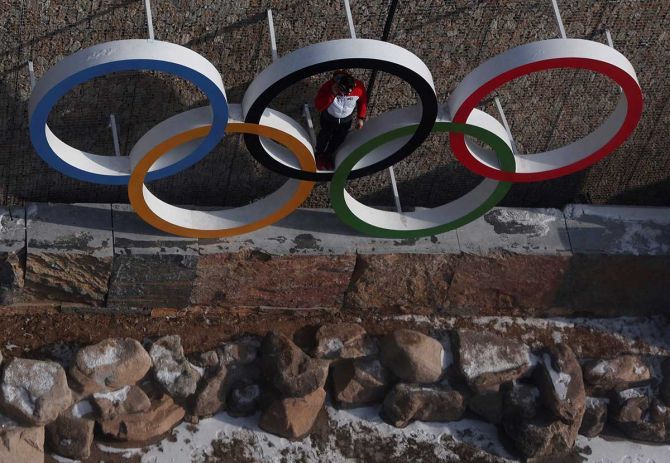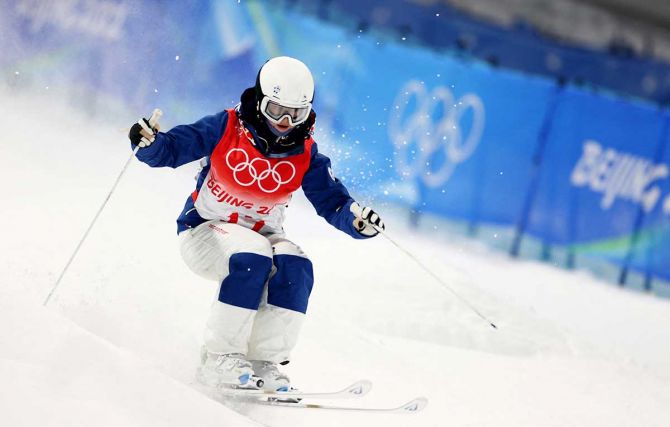'The Olympic Spirit has been thrown to the wind in Xi Jinping's China.'
'The International Olympic Committee is ready to kowtow to totalitarian China,' notes Claude Arpi.

The XXIV Olympic Winter Games will be hosted near Beijing by the People's Republic of China from February 4 to 20, 2022; the venues are the neighbouring towns of Yanqing and Chongli.
Beijing was selected as the host city in July 2015 at the 128th IOC Session in Kuala Lumpur; it will be the first Winter Olympics in China.
Beijing will also be the first city to have ever hosted both the Summer and Winter Olympics, but ...there a 'but'.

There is a tendency to forget why the Modern Olympics came into being.
At the end of the 19th century, a French baron, Pierre de Coubertin, decided to revive the Olympic Spirit by emulating the ideals of ancient Greece: Body, mind and spirit should be developed simultaneously to produce complete beings.
Coubertin's interpretation of the Olympic motto, Fortius, Citius, Altius is fascinating.
- Fortius (Stronger), it refers to the body which had to be trained by repeated exercises to become healthier and stronger.
- Citius (Swifter) is connected with the mind, the intellect as well as literary and scientific studies.
- Altius (Higher) had a deeper meaning connected with the sacred.
All three levels had their importance; in common was the centrality of the 'effort' to overcome oneself to reach a higher goal.
The mastery of oneself, generosity and respect for others were essential, not only in sport, but in life as well.
The creed of the Games remains: 'The most important thing in the Olympic Games is not to win but to take part, just as the most important thing in life is not the triumph but the struggle. The essential thing is not to have conquered but to have fought well.'
All this has been totally forgotten in the modern world where education has become just a means to get a diploma and ultimately a lucrative babu's job or a more creative one for the lucky ones.
Apart from the Spirit of the Games so important to Coubertin, as far back as 776 BC, the Greeks had introduced the Olympic Truce: A truce or ékécheiria ('laying down of arms') was announced before the Olympic Games so that all athletes and spectators could travel safely to the Games and peacefully return to their respective countries.
The official Olympic Truce logo has three elements: A dove, flames, and the Olympic rings; the logo symboliSed by the dove of peace with the traditional Olympic flame in the background while the flame is made up of colourful effervescent elements, reminiscent of festivities experienced in the celebration of the human spirit: all races coming together for the observance of the Truce.
Of course, the Spirit and the Truce have been thrown to the wind in Xi Jinping's China and the International Olympic Committee, which primarily serves its own economic ends, is ready to kowtow to totalitarian China for the purpose.
On January 23, according to Taiwan's defence ministry, China sent 39 military aircraft into Taiwan's air defense identification zone, escalating tension in the Taiwan Straits. Where is the Olympic Truce? The Communist leaders have probably never heard of this concept.
At the same time, Jin Canrong, a senior Chinese academic who advises Beijing on foreign policy, said that the Chinese mainland could bring the Taiwanese island under its control in a week. Nikkei in Tokyo titled: 'China eyes 'armed unification' with Taiwan by 2027'. The scholar argued that China will take over Taiwan by 2027.
Worse perhaps, on the occasion of the opening of the Games, Xi Jinping has invited Russian President Vladmir Putin for discussions on the Ukraine situation.
Is it the time and place to discuss war?

The Beijing Winter Olympics will see mild 'diplomatic boycotts' to protest the Uyghur 'genocide' as well the poor human rights situation in China (particularly in Tibet). The United States, United Kingdom, Canada, some European Union nations along with Australia have declared a 'diplomatic boycott' of the Games; the countries will, however, send athletes to compete.
Everyone fears the 'wolf warriors in Beijing and while China is going through new waves of the COVID pandemic, nobody dares to ask questions about the origin of the virus anymore; who wants to risk embarrassing Beijing today?

According to the Chinascope Web site, which quoted CCTV, China's official television channel: 'CCP Organized Chinese Olympics Athletes to Vow to Compete for Its Superior Leader.'
On January 25, the Chinese Communist party organised a meeting at Tiananmen Square with over 170 athletes competing in the Winter Olympics Games; Chinese sportspersons had to take a vow: 'rare to see in China these days but common during Mao Zedong's era', says the Chinascope web site linked to The Epoch Times newspaper. The vow consisted of five sentences, far away from the original Olympic motto Fortius, Citius, Altius:
- For the sake of the motherland -- rush, rush, rush.
- To live up to the people's expectations -- fight, fight, fight.
- To repay the Superior Leader [Xi Jinping] I will spare no effort.
- Always compete for first place and never give up.
- Follow the CCP's General Secretary [Xi Jinping] to go to the future.
Many Chinese netizens criticised the vow for praising Xi Jinping: 'People can only see this style of communication in North Korea's propaganda.' CCTV reported the event, but its video cut out the third and fourth sentences.

Taiwan's Olympic contingent of 15 athletes, competing under the name 'Chinese Taipei', has decided not to participate in the opening or closing ceremonies due to its concern that Beijing will use the events to assert its jurisdiction over the island.
But Beijing's propaganda continues unabated; Xi Jinping stressed that the renovation and construction of the venues for the Beijing Winter Olympics and Winter Paralympics have incorporated many Chinese elements, reflecting China's cultural self-confidence.
The WION television news channel observes that China has vowed to purge the Internet ahead of the Lunar New Year and Winter Olympics. WION quoted China's cyberspace administration which announced that its aim is only to create a 'healthy, happy, and peaceful online environment'.
China's cyber regulatory body issued draft rules governing mobile apps, including a requirement for security reviews of apps whose functions could influence public opinion.
The regulator stated that mobile app providers must not conduct activities that endanger national security, or force users to share non-essential personal information; at the same time, Thomas Bach, the International Olympic Committee president, said: 'I don't care how many gold medals Chinese athletes win this time, I care more about the motivation and vitality it will inject into us in the future.'
In the meantime, Beijing is battling to contain the spread of COVID-19 for which the Chinese government has taken the most rigid measures.
According to the German think-tank The Mercator Institute for China Studies: 'Athletes, officials and journalists attending the two-week event face strict measures regarding their movements and data -- like being locked in a closed-loop of official venues, hotels and transportation.'
'Chinese citizens have been asked to sacrifice their annual family reunions and stay put for the week-long Spring Festival holiday, starting January. ...The line between sensible Covid restrictions and authoritarian control over the Olympics sometimes seems to blur.'
The BBC also noted that this will be the first Winter Olympics to rely entirely on artificial snow; while some events will be held in the middle of the Songshan nature reserve in Yanqing -- over an area bigger than a thousand football pitches: 'The construction required removing more than 20,000 trees, which was done during the last few years.'
All this is reminiscent of the 1936 Berlin Olympics, which saw a grand show of the Nazi regime and its fuhrer Adolf Hitler...
Feature Presentation: Ashish Narsale/Rediff.com









